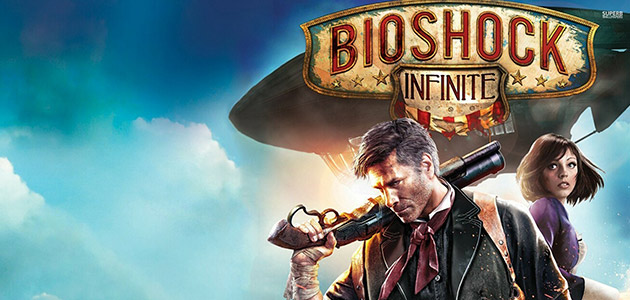10 December 2013
Bioshock Infinite and the prevention of evil
by Naomi Quirke
Various members of my family have recently completed the computer game Bioshock Infinite. Since it is not a multi-person game, I only joined in to watch when the plot advanced significantly, and of course, I saw the beautiful ending.
Contemplating the ending, I have since wondered whether the only outcome prepared for the main character is that seen as logical by the game designers, and perhaps by extension, some segment of our society. It gifted me a moment of contemplation on the unexpected outcomes that God produces for us out of our choices, and the different choices we have as Christ-followers.
I thought to share some of those differences, but **warning** this will involve plot spoilers for the game... so don't read on if you plan to play! (And it is a gorgeous game with interesting ideas, social commentary, great music, graphics and fun details, so don't let this little post spoil it for you.)
Towards the end of the game, the main character, Booker, destroys his evil antagonist, Comstock, and Comstock's evil is effectively halted. Booker then discovers that Comstock is actually another version of himself from a parallel universe. The difference between them is a choice made differently at the beginning of their adulthood, igniting a chain reaction of consequences. Unfortunately, there are a large number of parallel universes all splitting off from that crucial decision point, and in the high majority of them, the Comstock version of Booker was dominant. In the final scenes of the game, Booker travels through the dimensions to the point at which he/Comstock made that crucial decision, and he lets himself/Comstock) be killed in the execution of Comstock’s choice. This somehow destroys the incipient Comstock from all possible future universes. Still remaining, however, is a version of Booker that did not make Comstock’s choice - this version is one that will now always be free from Comstock’s interference.
The thing that struck me most was how the only possible choice at this end point in the game is to totally destroy Comstock before he had a chance to do his evil actions, despite the game elsewhere offering several choices, each seemingly of moral significance. This story world is a unique one that sort-of allows the protagonist to separate out the evil that is in his own heart and destroy it (cf. Solzhenitsyn, “But the line dividing good and evil cuts through the heart of every human being. And who is willing to destroy a piece of [their] own heart?” quoted in McConnell’s post https://www.laidlaw.ac.nz/_blog/Our_Blog/post/arrow-and-the-myth-of-redemptive-violence).

I wonder if too many of us try to forget, redefine or refuse to acknowledge unattractive aspects of ourselves, thereby destroying parts of our hearts, but failing to deal with the fundamental issues. I can’t be the only one who has thumped my head, crying out “idiot idiot”, then done my best to forget the related painful incident. All sorts of psychological labels are associated with our attempts to change our self-perception, to block out of ourselves what is evil, imperfect and socially unacceptable. Of the 541 people who took their own lives in NZ last year, could some have judged themselves to destruction?
God created humans with free will, able to do evil. Then he himself came into our world as a human, and showed how resurrection-life is able to transform pointless destruction, even the destruction that goes on inside our own heads. It seems that God doesn't fix things by undoing evil. He transforms people, allowing them to rethink their experiences, rebuild out of them, and even participate in transforming the situations and people around them.
I spent a fair time of my growing years wondering why thoughtful Christians allow themselves to have children, when there is a high chance that their children would reject God and end up in Hell. In essence, I was wondering why potential parents don’t stop the evil before it has a chance to develop.
But reviewing that question with respect to Bioshock Infinite and Jesus' message, I can say now: life is truly precious in all its complications. We have forgiveness and hope to bring. Our God is able to transform everyone, no matter what the starting point is, no matter what evil anyone has created... or will create.
The destruction of Comstock before he ever existed resulted in the never-existence of the beautiful (but also terrible) floating city that Comstock founded, the never-existence of the wonderful heroine formed from the fires of her childhood story. I wonder what the result would have been if Comstock had been transformed instead.
There is a lot more to this game than this little piece I've picked up. See this blog for another comment: http://www.incgamers.com/2013/04/the-bird-or-the-cage-what-bioshock-infinite-says-about-choice-and-fatalism, or just Google the game and pick up the chatter.
